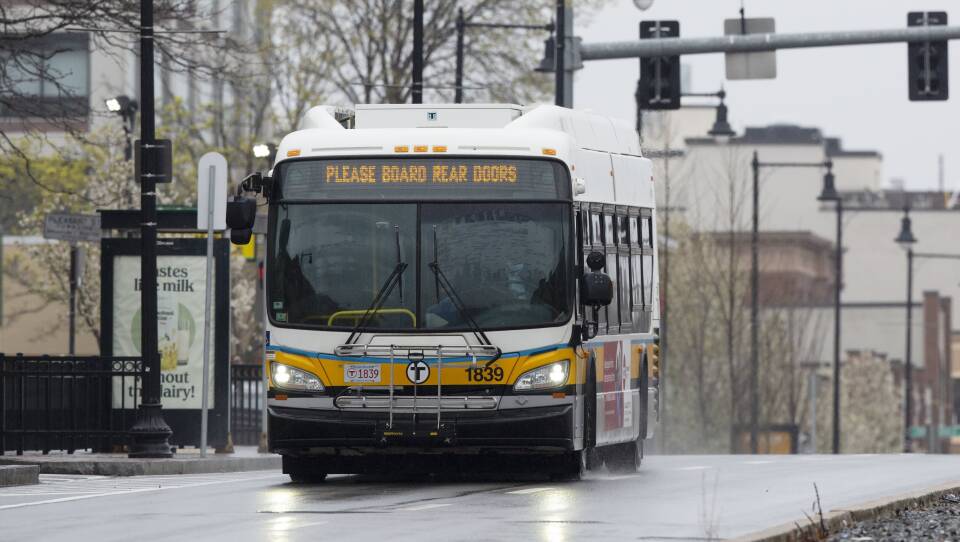A trio of MBTA bus routes in Boston will continue to operate without charging fares for another two years thanks to an investment of more than $8 million from the city, Mayor Michelle Wu announced Tuesday.
While the transit agency prepares to roll out an expanded system-wide low-income fare option, Wu said her administration would continue to use federal pandemic aid to cover the costs of running the Routes 23, 28 and 29 buses free to riders.
The city-funded program, which started with the Route 28 bus in August 2021 and expanded to three routes in February 2022, was set to expire at the end of the month. Wu's office said Boston will use $350,000 per month in American Rescue Plan Act funding -- which comes out to about $8.4 million over the course of two years -- to keep the three bus routes fare-free until March 2026.
"Fare free bus routes have been proven to make public transportation more convenient, accessible, and affordable for our residents who depend on transit to get to work and school," Wu said in a statement. "Community members have emphasized that this program helps them save money, and encourages more trips without worrying about exact change or rationing travel. Since this program started, we have seen similar initiatives take off around the Commonwealth and the country."
The Route 23 bus runs from Ruggles to Ashmont, the Route 28 connects Ruggles and Mattapan, and the Route 29 links Jackson Square in Roxbury with Mattapan. Wu's office said more than half of their combined riders are classified as low-income, and noted that ridership is close to or above pre-pandemic levels on both the Route 23 and Route 28.
Citing data the city acquired from a partnership with Stantec, Wu's office said riders have taken more than 12 million trips on the routes since the fare-free program began, saving a collective $6 million in fares. About half of riders save money, averaging $35 per month in the fall, while the other half still pay fares because they need to purchase a pass or transfer to another part of the T, according to the mayor.
Some smaller transit agencies like the Merrimack Valley Regional Transit Authority have also embraced no-cost buses in recent years.
Supporters argue that eliminating fares not only helps make transit more affordable for lower-income patrons, but can also attract new riders and offset some of the frustration that many feel while grappling with unreliable service.
"Boston, Merrimack Valley, Worcester and many other communities across the country have demonstrated bold leadership in the face of strong skepticism," LivableStreets Alliance Executive Director Stacy Thompson said in a statement provided by Wu's office. "But the last few years, and thousands of happy bus riders, have proven that fare free buses are a straightforward way to increase transit ridership, ease financial burden for many, and bring a little joy back to the T. The success of Boston's fare free bus program is undeniable and we're thrilled that Boston is extending this program."
While Wu and transit activists have pitched the program as a success, MBTA officials have not moved to eliminate fares on other parts of the system, which relies on fare revenue for a major portion of its budget.
The agency is on the verge of launching a new low-income fare option that would effectively cut prices for eligible riders in half. Some riders already qualify for reduced-cost programs aimed at seniors and students, but MBTA officials estimate there are tens of thousands more people between the ages of 26 and 64 who are income-eligible but unable to access an existing option.
Gov. Maura Healey called in her fiscal year 2025 state budget for directing $45 million toward the T to cover the costs of launching the new reduced-fare program.
In a statement provided by Wu's office, MBTA General Manager Phil Eng thanked the city for its "continued support" and linked the different approaches the mayor and governor want to take to fares.
"We have a common goal in making mass transit more affordable," Eng said. "Our combined efforts, from Boston's fare-free bus program to Governor Healey's proposed Low Income Fare Program, are benefiting communities who take all different modes of transit -- buses, subways, commuter rail, ferries, or paratransit. We are improving people's quality of life and making a real difference, building a more equitable and affordable transportation system network for all who depend on it."







